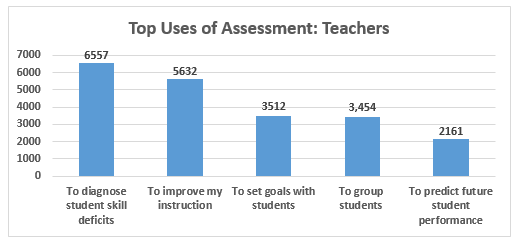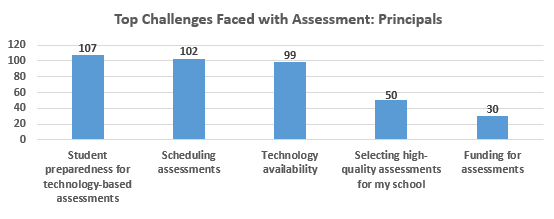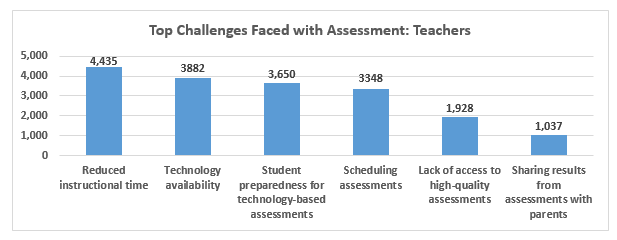“You have to lay out a calendar. We just had a principals’ meeting in our district, and we looked at our calendar. We highlighted with colors the different tests and whether it’s no teaching that day. I thought, what if you give teachers this  calendar and say, ‘Go find your days to teach.’ Those are important.” With those words in a recent SCORE-conducted focus group, a Tennessee middle school teacher expressed the frustration of many educators statewide that the state’s current approach to student testing too often detracts from instructional time. Further, the state’s assessments too often strike educators as unaligned with curriculum standards and tie up educational technology, detracting from students’ ability to gain experience with the devices they will use to take the tests.
calendar and say, ‘Go find your days to teach.’ Those are important.” With those words in a recent SCORE-conducted focus group, a Tennessee middle school teacher expressed the frustration of many educators statewide that the state’s current approach to student testing too often detracts from instructional time. Further, the state’s assessments too often strike educators as unaligned with curriculum standards and tie up educational technology, detracting from students’ ability to gain experience with the devices they will use to take the tests.
These concerns and others have prompted a statewide review of student assessment. Earlier this year, Commissioner of Education Candice McQueen established the Tennessee Task Force on Student Testing and Assessment to:
• Identify and study best practices in student assessment;
• Ensure local school districts and the state are appropriately using assessments to improve student achievement; and
• Better inform stakeholders about the state assessment program
This week, the Tennessee Department of Education released the task force’s report, and important findings include:
• Many teachers feel they spend too much time preparing students for statewide exams, and those exams do not reflect the state standards for what students should learn in a given year.
• A growing number of teachers report better understanding how to use student assessment results to tailor their teaching to meet students’ learning needs.
Based on the input of task force members and feedback from educators statewide, the task force has presented key principles for assessment going forward in Tennessee, along with recommendations for the state and local education leaders. These principles, coupled with the report’s recommendations and directions for further analysis, represent a milestone moment for how assessments are understood and administered. Principles and recommendations reflect the task force’s overarching call promoting greater alignment across educational standards and the assessments students take. This alignment will provide a foundation for an approach to assessment that reduces time away from instruction and equips teachers with data they can use to address the educational needs of their students. The full report is now available online.
In addition to the task force’s important work, SCORE conducted a statewide survey of district leaders, principals, and teachers—as well as a series of interviews and focus groups—to ensure Tennessee educator voices are heard in the process of improving how student assessment is done and acted upon. More than 13,000 teachers, 286 principals, and 69 superintendents responded to our surveys. In addition, more than 300 educators took part in a total of 40 focus groups statewide. Based on input received, we identified a set of findings, which include those detailed below.
• Teachers, principals, and district leaders pointed to the unique value of assessment in driving key decisions at the classroom, school, and district levels. For example, educators discussed using data from assessments to determine appropriate instruction, teacher support practices, and student interventions. One district leader related how teachers share input in selecting local assessments that can best guide student instruction: “We have weekly team meetings where we look at new assessments that are coming out, we look at samples, and we sit down around the table and just kind of hash it out. We discuss what we feel is the best product to meet our needs. So our teachers are very, very involved in our decision-making process.”
 • District leaders and principals identified assessment logistics, such as scheduling and implementing technology-based assessments, as top challenges faced in their roles.
• District leaders and principals identified assessment logistics, such as scheduling and implementing technology-based assessments, as top challenges faced in their roles.

• Teachers identified lost instructional time as a result of both district- and state-level assessments as a top challenge faced in their roles.
Although educators statewide have been frustrated by the lack of alignment between assessments and learning standards, as well as the amount of time taken away from instruction to prepare students for those assessments, they do believe in the power of assessment results to inform teachers, parents, and students about how students are learning and in what areas they need more support. Teachers are gaining skills in putting data from assessment results to use as they adjust their instruction to better support students in those areas.
As the state prepares to implement new TNReady assessments to replace the long-standing Tennessee Comprehensive Assessment Program, or TCAP, there is cause for positive thinking about the future of assessment. TNReady assessments are intentionally designed to reflect Tennessee State Standards for learning. Rather than forcing teachers and schools to shut down instruction to prepare students for testing, the content students learn in class should prepare them to demonstrate content mastery on assessments. And where students continue to struggle, teachers can respond by collaborating with their colleagues and employing new instructional approaches. One principal expressed the optimism accompanying the arrival of TNReady: “I love to see that finally the state test will be more aligned to the increased standards that we have. It’s been really challenging straddling the fence between TCAP and our standards. So I’m really looking forward to TNReady and so are my teachers. It’s safe to say that for most of the teachers in our district, they’re looking forward to having a test that aligns to how they are teaching.”
Ultimately, standards and assessments that set high standards can provide a foundation to better prepare students for success well beyond their test-taking days.
SCORE’s report, Teaching, Testing, and Time: Educator Voices on Improving Assessment in Tennessee is now available online.

